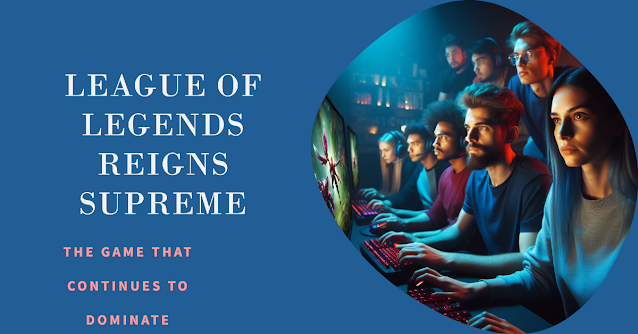Why League of Legends Still the King of MOBAs (Even After 15 Years!)
Hey Summoners! Ever wondered why League of Legends (LoL) is still a massive hit, even after almost 15 years? It's true; League has dominated the MOBA scene for so long that it seems like it shouldn't be possible. But the answer lies not just in the game itself but in the genius of Riot Games. So buckle up, and let's dive into the reasons why League continues to crush the competition.
From Humble Beginnings to a Global Phenomenon
League of Legends wasn't always the polished giant we know today. The story starts with the founders, who weren't even game developers! They were passionate gamers obsessed with a Warcraft 3 mod called DOTA, the godfather of MOBAs.
They saw the potential for a standalone DOTA experience, but with a twist: free-to-play. This was a radical idea back then. Most games were full-price purchases. But Riot, the newly formed studio behind League, believed in making the game accessible to everyone.
How Do They Make Money in Free to Play
This free-to-play model was a gamble, but a brilliant one. Instead of charging upfront, Riot planned to make money through in-game cosmetics like character skins. The idea was to create a massive player base, then offer them ways to personalize their experience.
Back in the day, most games cost money upfront. But Riot saw things differently. They made LoL completely free to play, with cosmetics like skins being the way they make money. This opened the door to a massive player base that wouldn't have otherwise tried the game. It turns out, people love free stuff!
Building a Competitive Empire
The league wasn't just about accessibility; it was about competition. Riot introduced ranked mode, allowing players to climb the ladder and test their skills. This fueled a hard-core community and an addictive gameplay loop.
Esports: Taking League to the Next Level
Riot was also a pioneer in eSports. They invested heavily in competitive tournaments, creating a spectacle that attracted millions of viewers. This further solidified the League's position as the premier MOBA.
League Of Legends is More Than Just a Game
League isn't afraid to think outside the box. They've collaborated with popular artists for viral World Anthems and even produced the hit series Arcane on Netflix. These ventures keep the League brand fresh and relevant, attracting new generations of players.
Related Topics:
- How to Become a Successful Online Streamer: Lessons from Valkyrae
- Donny Pangilinan's Upcoming eSports Movie
- Counter Strike 2 (CS2) will be better than Valorant?
The Secret to League's Success
So, what can we learn from League of Legends? It's clear that the game itself is important, but it's the model and brand that truly set League apart.
Being free-to-play was a bold move, but it wasn't the only one. Here's what else sets League apart:
- The Competitive Grind: Riot introduced ranked mode, letting players climb the ladder and prove their skills. This competitive itch kept players hooked for hours on end.
- Constant Content: New champions, balance changes, and regular updates kept the league feeling fresh and exciting.
- Esports Powerhouse: Riot is heavily invested in the esports scene, with huge tournaments and massive prize pools. This fueled the competitive fire and turned LoL into a spectator sport.
- Lost Leadership Strategy: This fancy term means Riot doesn't mind losing money on certain things, like esports events. Why? Because it elevates the brand and makes people want to buy those sweet, sweet skins.
- Marketing Masters: From viral K-Pop groups to banging music videos for Worlds, Riot knows how to keep League in the conversation. They even have a hit show on Netflix, Arcane!
About the Writer
Jenny, the tech wiz behind Jenny's Online Blog, loves diving deep into the latest technology trends, uncovering hidden gems in the gaming world, and analyzing the newest movies. When she's not glued to her screen, you might find her tinkering with gadgets or obsessing over the latest sci-fi release.What do you think of this blog? Write down at the COMMENT section below.

No comments:
Post a Comment